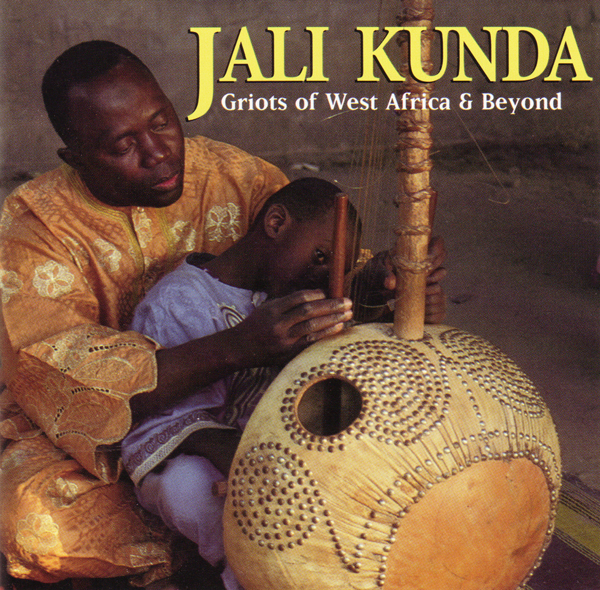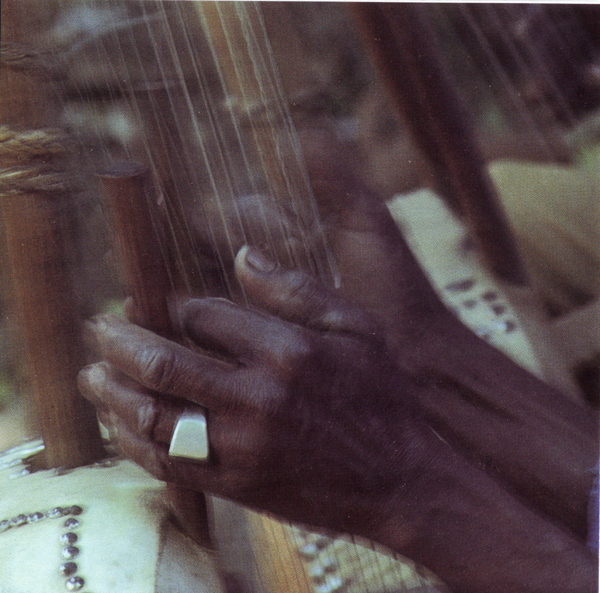JALI KUNDA




1/ Allah l'aake (Kolda, Senegal) (Traditional) 2.38
2/ Sunjata (Tabato, Guinea-Bissau) (Traditional) 5.40
3/ Sinyaro (Brikama, The Gambia) (Traditional) 3.00
4/ Mariama (Kolda, Senegal) (Traditional) 4.24
5/ Spring Waterfall (Suso) 7.17
6/ Jula Faso (Brikama,The Gambia) (Traditional) 3.14
7/ Sunjata (Kolda, Senegal) (Traditional) 3.03
8/ Lanmbasy Dub (Suso) 8.19
9/ Jula Jekereh (Brikama,The Gambia) (Traditional) 4.42
10/ Lambango (Gabu, Guinea-Bissau) (Traditional) 2.42
11/ Samma (Suso) 8.25
12/ Sorrie (Brikama, The Gambia) (Traditional) 3.32
13/ Yata Kaya (Kolda, Senegal) (Traditional) 4.54
14/ Lambango (Tabato, Guinea-Bissau) (Traditional) 7.51
15/ Allah l'aake (Brikama, The Gambia) (Traditional) 3.30
Tracks were recorded at locations in West Africa, as indicated after
the song titles
Additional recording at Greenpoint Studios, Brooklyn, NY by Robert Musso
Phillip Glass on track 5 recorded at Looking Glass Studio, New York City
Engineering in Brikama, Gambia, Kolda, Senegal and in Gabu and Tabato,
Guinea-Bissau and mixing at Greenpoint Studio by Oz Fritz
Philip Glass recorded by Michael Riesman
Recording assistance and transportation in West Africa by Balla Camara,
Amadou Jallow and Eburima Cham
Engineering on track 8 by Robert Musso and Maritin Bisi
All music selected, coordinated and arranged by Foday Musa Suso
Soundtrack produced by Bill Laswell
Project co-produced and coordinated by Janet Rienstra
Pre-production, recording assistance in West Africa, coordination in NY
and graphic design on CD booklet by John Brown/Material Inc.
Executive Producer: Jeffrey Charno
Sequenced and mastered by Steven Miller for Cacophany Productions, NYC
(1) Foday Kuyateh, Tamba Kuyateh & Wuye Kanuteh: kora; Balla Camara: drums;
Jewuru Suso, Bobo Kuyateh, Musukuto Sakiliba, Jonfolo Sakiliba: singers;
(2) Omar Jobarteh, Sambel Jobarteh & Fili Jobarteh: balafon; Yaya Jobarteh &
Bobo Jobarteh: drums; Mairan Jobarteh, Jalimakang Konteh, Manda Jobarteh, Safi
Kuyateh, Keitta Dindingo, Fatou Suso, Jalifatuma Camara, Mairon Camara: singers;
(3) Bolong Suso, Surakata Suso, Karunka Suso, Cherno Suso, Jewuru Kanute &
Musa Kanute: kora; Funeh Kuyateh, Demmu Suso, Bobo Suso, Ndaga Kuyateh, Tida
Kanuteh & Nyalin Kuyateh : singers; (4) Momodu Salifu Baldeh & Mamadon Baldeh:
nyanyer, voice; Sambel Mballo, Babakary Jallow, Mansa Baldeh, Dikory Siedy &
Ganya Siedy: drums; (5) Foday Musa Suso: kora; Philip Glass: piano; (6) Bolong Suso, Surakata Suso, Karunka Suso, Cherno Suso, Jewuru Kanute & Musa Kanute :
kora; Funeh Kuyateh, Demmu Suso, Bobo Suso, Ndaga Kuyateh, Tida Kanuteh
& Nyalin Kuyateh: singers; (7) Jewuru Suso, Bobo Kuateh, Musukuto Sakiliba
& Jonfolo Sakiliba : musicians, singers; (8) Foday Musa Suso: electric kora, voice,
percussion; Jeff Bova: electronic keyboards; Bill Laswell: bass, sampled sounds;
Nicky Skopelitis & Clive Smith: programming; (9) Mahamadou Suso, Mawudo Suso,
Suntu Kuyateh & Yaya Jassy : balafon; Funeh Kuyateh, Demmu Suso, Bobo Suso,
Ndaga Kuyateh, Tida Kanuteh & Nyalin Kuyateh: singers; (10) Abdou Kuyateh, Sirifo
Kuyateh, Burema Kuyateh, Madi Jollo & Kekuto Suso: kora; Malang Kuyateh, Jaali
Kuyateh, Aminata Kuyateh, Wudeh Kuyateh & Isatou Kuyateh: singers; (11) Foday
Musa Suso: kora; Pharoah Sanders: tenor saxophone; (12) Mahamadou Suso,
Mawudo Suso, Suntu Kuyateh & Yaya Jassy: balafon; Funeh Kuyateh, Demmu Suso,
Bobo Suso, Ndaga Kuyateh, Tida Kanuteh & Nyalin Kuyateh: singers; (13) Momodu
Salifu Baldeh & Mamadon Baldeh: voice, nyanyer; Sambel Mballo, Babakary Jallow,
Mansa Baldeh, Dikory Siedy & Ganya Siedy: drums; (14) Omar Jobarteh, Sambel
Jobarteh & Fili Jobarteh: balafon; Yaya Jobarteh & Bobo Jobarteh: drums; Mairan
Jobarteh, Jalimakang Konteh, Manda Jobarteh, Safi Kuyateh, Keitta Dindingo, Fatou
Suso, Jalifatuma Camara, Mairon Camara: singers; (15) Bolong Suso, Surakata
Suso, Karunka Suso, Cherno Suso, Jewuru Kanute & Musa Kanute: kora; Funeh
Kuyateh, Demmu Suso, Bobo Suso, Ndaga Kuyateh, Tida Kanuteh & Nyalin Kuyateh:
singers.All music selected, coordinated and arranged by Foday Musa Suso
1997 - Ellipsis Arts (USA), CD3511 (CD+Book)
1997 - Ellipsis Arts (USA), CD3511 (CD)
Note: There is a version available as a CD only and a version which
includes a 96 page full color book photographed on location in West
Africa. It also includes written contributions from Robert Palmer, Amiri
Baraka and J.H. Kwabena Nketia.
Richard Klacka (courtesy of the Conscious Choice website)
Through weak and strong releases alike, the packaging of ellipses arts label recordings has usually been impeccable. But the container gurus must have nodded approval in their sleep for Jali Kunda, a fat, glossy-covered boxed set containing not three, not four, not even five, but a single, solitary cd swimming in cardboard plus a soft-cover book the size of a National Geographic. What's wrong with the hardcover-book plus inside-back-cover slipcased disc format that the label's used for its last slew of recordings? When I stumble across an illustrated cardboard box in a cd store, I take the cover admonition "Book and Compact Disc" with the proverbial grain of salt, expecting to find an absolute minimum of two discs inside, especially when the subject matter warrants it. And ‘Jali Kunda’ does.
As you'll probably learn elsewhere in this issue, this project is the result of Mandingo Griot Society founder Foday Musa Suso's return to his roots in Senegambia, and his Bill Laswell-produced collaboration with extended family members on kora, balafon, nyanyer one-stringed fiddle, and percussion. The disc also features three experimental tracks with Philip Glass, Pharaoh Sanders, and the Griot Society (in remix) that seem out of place interspersed with the traditional pieces. A two disc set would have made more sense, one devoted to the Jali tradition, another showcasing innovation. Considering Suso's long personal history of crafting successful African fusion music with Herbie Hancock, Laswell and others, it's surprising that the modern pieces seem tentative. Only "Spring Waterfall" featuring Phillip Glass on massed keyboards resists being eclipsed by the traditional songs, primarily because, rather than trying to match their raw intensity, Glass opts for locking into a hypnotic rhythm with one of his trademarked repetitive musings. "Samma," a jam with jazz saxophone legend Pharaoh Sanders, is provocative, but feels like a precursor to more developed pieces that fail to follow.
The roots music chunk of ‘Jali Kunda’ is some of the strongest griot material on record. From the first few seconds of the first track, "Allah I'aake" ("God's Will"), the energy bristles and never lets up throughout the beautifully mixed field recordings. Calling the acoustic material traditional is a bit of a misnomer unless you accept the fluidity of tradition, since my favorite track here, "Mariama," boasts a wicked nyanyer riff backed by the unusual addition of drums. This piece is so powerful, I'm grateful for Robert Palmer's introduction to the book which reminds me that much of traditional-based African music can only be understood when its divinatory and magical aspects are taken into consideration. In "Mariama" and in other cuts that feature the ecstatic Mandinka vocal style you either love or hate, depending on your tolerance for over-the-top emotional expression, the spiritual dimension is unmistakable. And so is the connection to American blues and gospel. ‘Jali Kunda’ is one-half of a wonderful release that suffers from the grab-bag production approach that I thought ellipsis arts had finally outgrown.
Bob Tart (courtesy of the The Beat website)